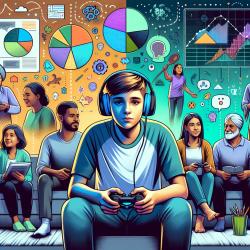Introduction
In the realm of adolescent therapy, the rise of Internet Gaming Disorder (IGD) presents a unique challenge for practitioners. The recent study, "Multidimensional Family Therapy Reduces Problematic Gaming in Adolescents: A Randomised Controlled Trial," provides valuable insights into effective treatment strategies. This blog aims to translate these findings into actionable steps for practitioners seeking to enhance their therapeutic approaches.
Understanding Multidimensional Family Therapy (MDFT)
Multidimensional Family Therapy (MDFT) is a comprehensive therapeutic approach designed to address a range of adolescent behavioral issues, including substance use disorders and delinquency. The therapy targets risk and protective factors across several domains, such as family, peers, and school. The study highlights MDFT's effectiveness in reducing IGD symptoms more significantly than traditional family therapy approaches.
Key Findings and Implications
The study involved a randomized controlled trial comparing MDFT with family therapy as usual (FTAU). Results indicated that both therapies reduced IGD prevalence, but MDFT showed superior outcomes in symptom reduction and family retention. Notably, MDFT's structured approach, focusing on family communication and relationship improvement, contributed to its success.
Implementing MDFT in Practice
Practitioners can leverage the following strategies from MDFT to enhance their treatment of adolescent IGD:
- Focus on Family Dynamics: Prioritize improving family communication and relationships. Encourage open dialogue between adolescents and their parents to bridge perception gaps regarding gaming issues.
- Structured Intervention Stages: Implement MDFT's three-stage process: enhancing motivation, executing targeted interventions, and developing relapse prevention plans.
- Holistic Approach: Address multiple life domains, including school and peer interactions, to provide a comprehensive support system for adolescents.
- Therapist Training: Ensure therapists are trained in MDFT techniques and adhere to treatment fidelity to maximize therapy effectiveness.
Encouraging Further Research
While the study provides promising results, it also underscores the need for further research to validate MDFT's effectiveness on a larger scale. Practitioners are encouraged to contribute to this growing body of research by documenting and sharing their experiences and outcomes with MDFT in diverse settings.
Conclusion
MDFT offers a robust framework for addressing IGD in adolescents, emphasizing the importance of family involvement and multi-domain interventions. By adopting MDFT principles, practitioners can enhance their therapeutic impact and contribute to the well-being of adolescents struggling with gaming disorders.
To read the original research paper, please follow this link: Multidimensional family therapy reduces problematic gaming in adolescents: A randomised controlled trial.










